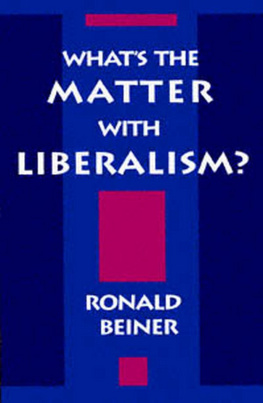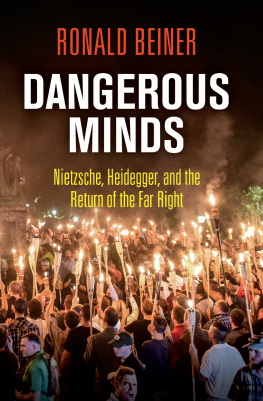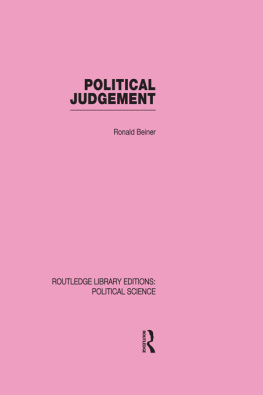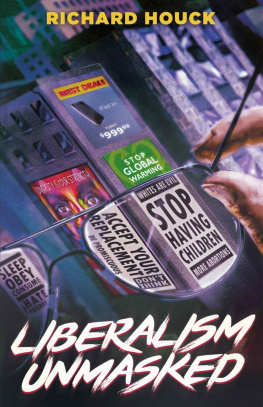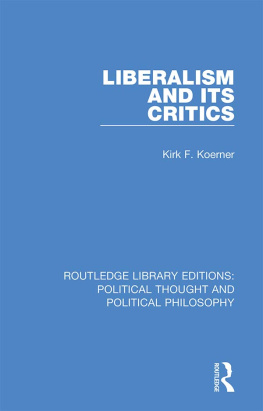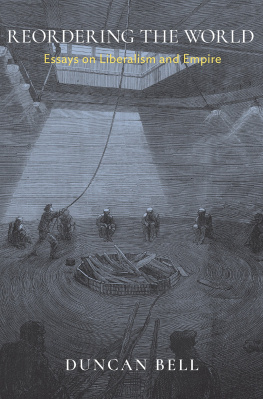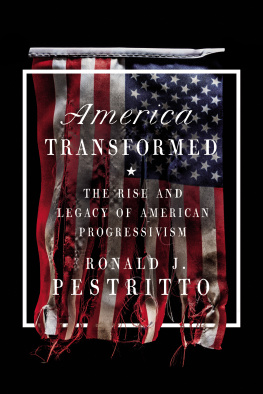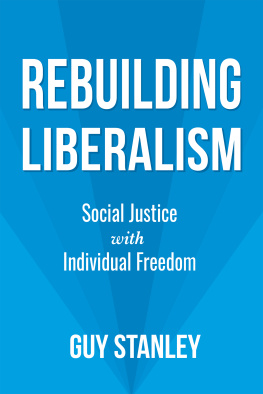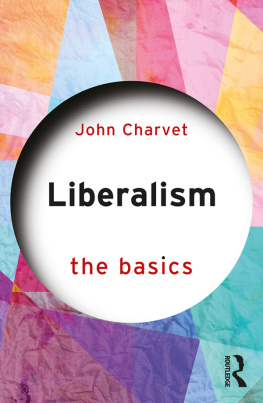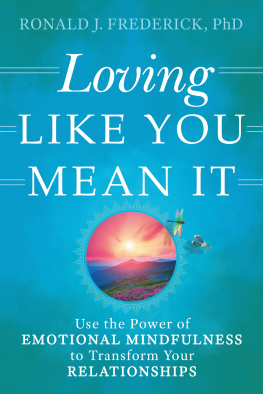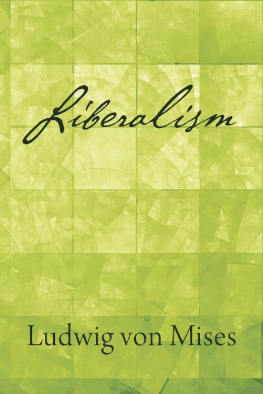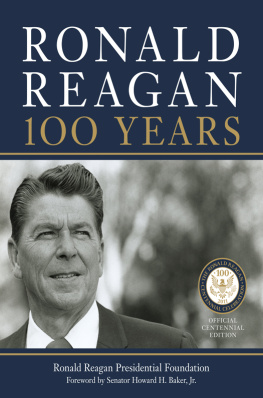Ronald Beiner - Whats the Matter with Liberalism?
Here you can read online Ronald Beiner - Whats the Matter with Liberalism? full text of the book (entire story) in english for free. Download pdf and epub, get meaning, cover and reviews about this ebook. year: 1995, publisher: University of California Press, genre: Politics. Description of the work, (preface) as well as reviews are available. Best literature library LitArk.com created for fans of good reading and offers a wide selection of genres:
Romance novel
Science fiction
Adventure
Detective
Science
History
Home and family
Prose
Art
Politics
Computer
Non-fiction
Religion
Business
Children
Humor
Choose a favorite category and find really read worthwhile books. Enjoy immersion in the world of imagination, feel the emotions of the characters or learn something new for yourself, make an fascinating discovery.
- Book:Whats the Matter with Liberalism?
- Author:
- Publisher:University of California Press
- Genre:
- Year:1995
- Rating:3 / 5
- Favourites:Add to favourites
- Your mark:
- 60
- 1
- 2
- 3
- 4
- 5
Whats the Matter with Liberalism?: summary, description and annotation
We offer to read an annotation, description, summary or preface (depends on what the author of the book "Whats the Matter with Liberalism?" wrote himself). If you haven't found the necessary information about the book — write in the comments, we will try to find it.
Whats the Matter with Liberalism? — read online for free the complete book (whole text) full work
Below is the text of the book, divided by pages. System saving the place of the last page read, allows you to conveniently read the book "Whats the Matter with Liberalism?" online for free, without having to search again every time where you left off. Put a bookmark, and you can go to the page where you finished reading at any time.
Font size:
Interval:
Bookmark:
What's the Matter with Liberalism? Ronald Beiner UNIVERSITY OF CALIFORNIA PRESS Berkeley Los Angeles Oxford 1992 The Regents of the University of California |
This little book was mainly put together during a time of remarkable revolutionary upheavals in Europe. The Central European revolution was hailed in the liberal, market-oriented West in a selfcongratulatory mood. The self-congratulation was thought to be warranted because, first, the West had "won" a certain kind of war that had been waged in the preceding four decades, and second, because the economic dynamism of liberal societies was deemed to be the decisive mark of superiority of the West over the East in the winning of this war. One of the intentions of this book was to question whether uncritical self-congratulation was the most suitable way in which to receive the great changes in the socialist world. The appropriate questions for us have in fact already been formulated by one of the leaders of that revolution:
The post-totalitarian system has been built on foundations laid by the historical encounter between dictatorship and the consumer society. Is it not true that the far-reaching adaptability to living a lie and the effortless spread of social auto-totality have some connection with the general unwillingness of consumption-oriented people to sacrifice some material certainties for the sake of their own spiritual and moral integrity? With their willingness to surrender higher values when faced with the trivializing temptations of modern civilization? With their vulnerability to the attractions of mass indifference? And in the end, is not the greyness and the emptiness of life in the post-totalitarian system only an inflated caricature of modern life in general? And do we not in fact stand (although in the external measures of civilization, we are far behind) as a kind of warning to the West, revealing to it its own latent tendencies?[1]
Earlier versions of chapter 1 were presented at Queen's University, the University of Toronto, and the University of Dayton; a
[1] Vclav Havel, "The Power of the Powerless," in The Power of the Powerless, ed. John Keane (London: Hutchinson, 1985), pp. 38-39.
version of it was published in the Queen's Quarterly . Earlier versions of chapter 2 were presented at Osgoode Hall Law School and McGill University; aversion of it was published in Law and The Community: The End of Individualism? edited by Allan C Hutchinson and Leslie Green (Toronto: Carswell, 1989).An earlier version of chapter 3 was presented at a meeting of the American Society for Political and Legal Philosophy, and is to be published in volume 34 of NOMOS, edited by John Chapman and William Galston. An earlier version of chapter 4 was presented at the University of Toronto Law Faculty. An earlier version of chapter 6 was presented at a private discussion group attended by Rebecca Comay, Dieter Misgeld, and Graeme Nicholson. A collage of various sections of the book, entitled " The Liberal Regime," is to be published in the Chicago-Kent Law Review; versions of it were presented at Harvard University and the Chicago-Kent College of Law. I am grateful for the use of material published elsewhere, grateful to the individuals and institutions that invited me to speak, and not least, grateful to the audiences that received and criticized what I presented. I have received very generous financial assistance toward the completion of the project from the Connaught Programme in Legal Theory and Public Policy, the Social Science and Humanities Research Council of Canada, and the Lynde and Harry Bradley Foundation, all of which I thankfully acknowledge. I must also express my deep appreciation for my good fortune in being able to conduct these studies in an environment so wonderfully conducive to work in political philosophy as the University of Toronto. I owe a debt to all my political theory colleagues, but in the completion of this project I have received particular help and encouragement from Joe Carens. Huge thanks must go to Brenda Samuels, Anna Apuzzo, and Mary Wellman for their tireless work on the manuscript. Finally, my companions on this voyage of writing should not go without mention: Ann, who dragged me to the resting-place of John Stuart Mill, aptly enough, to write chapter 5; and Zimra, citizen of the twenty-first century, whose claim to a better world gives a special impulse to these reflections.
AVIGNON
NOVEMBER 1990
Prologue: The Theorist as Storyteller
Political philosophers in the twentieth century have on the whole been a curiously self-abnegating lot. The majority of them have deliberately abstained from the large and deep speculations on the good society and the good for humanity that characterized the great tradition of Western thought. Political philosophers, at least those of the analytical variety, have confined themselves to the modest enterprise of conceptual analysistheoretical clarification of the concepts that figure prominently in political life. Philosophers within the Continenetal tradition have shown less abstinence, but where they did dare to pronounce on large, substantive questions of human nature and the essence of politics, they tended to reiterate well-established theories already on offer within the tradition. Of course, there are exceptions. But it is striking that even Jrgen Habermas, who is committed to offering a comprehensive theory of the rational society, can say in his book Legitimation Crisis that we can expect no guidance from metaphysically grounded theories of human nature. And with the influence of French poststructuralism gaining ground, and even more radical renunciation of traditional philosophy is demanded, and even a minimal appeal to shared rationality is rendered suspect.
Certainly within Anglo-American modes of thought one strains to think of any serious effort to formulate an original statement of the good for humanity. There are many who will say that now this has all changed. In recent years, with publication of John Rawl's A Theory of Justice and works of a similar king, vitality has once again returned to political life. However, it seems to me that however ambitious the work of Rawls may appear, it is in fact no less self-restricting and self-effacing than other work in the analytical tradition. One of the reasons for this is the insistence
on offering a guide to practical affairscutting theoretical speculation down to the need for practical decisions on the immediate questions of daily life. This is a conception of theory that Rawls shares with most other contemporary political philosophers. Indeed, the conception of political philosophy most prevalent in the Anglo-American world today is that of recommending policies: the function of the philosopher is to supply clever arguments for favoring one set of policies rather than another. Cutting theory off more sharply from immediate practice would restore to theory its freedom of speculationsomething always indispensable to original works of theory.
In many cases philosophers have failed to produce important reflections on moral and political life not for want of ability but because they believed it did not befit the philosopher to pronounce on what is important and essential in human life. In other words, they deliberately forsook such reflections on account of theoretical scruples. They were persuaded that such "modesty" was appropriate to the philosophical vocation.
Let us compare what may be considered appropriate to a great work of literature. The great novel or great drama often succeeds in disclosing what it means to be a human being, what is worthy or unworthy in human life, what is ennobling and what is degrading in human affairs; and the best literary characterizations may present us with exemplary human types.[l] It is not surprising, indeed it is only natural, if novelists, poets, and dramatists aspire to some major insight into human nature and the defining features of a significant human life. Why should the philosopher now aspire to less? Here the reply will come that the literary artist can allow himself or herself this indulgence because his or her preoccupation is with the world of imagination, not with the establishment of truth, whereas the philosopher's enterprise is one of cognition and requires that one set one's standards by the satisfaction of demonstrable claims to propositional validity. The literary imagination, it
Next pageFont size:
Interval:
Bookmark:
Similar books «Whats the Matter with Liberalism?»
Look at similar books to Whats the Matter with Liberalism?. We have selected literature similar in name and meaning in the hope of providing readers with more options to find new, interesting, not yet read works.
Discussion, reviews of the book Whats the Matter with Liberalism? and just readers' own opinions. Leave your comments, write what you think about the work, its meaning or the main characters. Specify what exactly you liked and what you didn't like, and why you think so.

